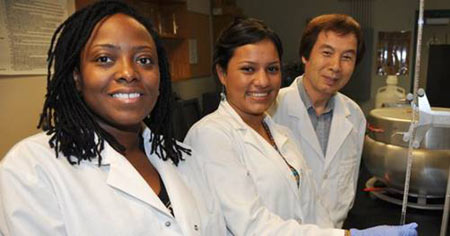
Karen Hernandez, a Senior at National University of Agriculture in Honduras
September 29, 2011 by Catracha Hondurena No Comments

Karen Hernandez, a Senior at National University of Agriculture in Honduras
While online seeking professors proficient in goat milk research, Karen Hernandez stumbled upon Dr. Young Park, an internationally recognized expert in dairy goat research at Fort Valley State University. After making contact by email, the Honduran student knew the institution would be a good place to gather data for her thesis before a December graduation.
The student from the National University of Agriculture (located in Catacamas, Honduras) took a three-hour flight in June to work in the lab comparing yogurts made from cow and goat milk. The food science major concluded that goat milk is easier to digest and has a softer texture. Hernandez returned home in September. She is thankful for the opportunity to learn from an expert and work with advanced equipment.
“In my college you don’t have the privilege of having all this equipment, so it’s been a new experience,” Hernandez said. “I appreciate all the people here, it’s pretty nice. And it’s a good, good university.”
The young scientist hopes to use the FVSU experience coupled with her college education to pursue a master’s and doctoral degree. She is considering a return to The Valley, which offers a master’s in animal science. Someday, the 21-year-old would like to own a goat processing center in her country.
Hernandez viewed operations at a processing facility housed in the Georgia Small Ruminant Research and Extension Center at FVSU. The 15,000-square-feet center, which also has a dairy operation, is visited by faculty, students and fellows from abroad. International guests have traveled from Mali, France, Armenia, New Zealand, South Africa and Turkey to the small ruminants facility, known for its research related to sheep and goats.
“A student can have positive and constructive training here for careers in food science, dairy technology and food chemistry,” said Park, Hernandez’s mentor. “She can be a good vehicle to expose and educate Hondurans, there at her university, about our goat research here so we can have further educational exchange programs.”
Hernandez’s public institution paid half the expenses for airfare, housing and meals; while her parents chipped in the rest.Throughout the student exchange process, Tracy Marshall, the diversity, international affairs and outreach officer at FVSU, remained involved to ensure Hernandez got settled in on campus and had housing and meal accommodations.Dr. Govind Kannan, dean of the FVSU College of Agriculture, Family Science and Technology, says exposure to international agriculture, cultures and traditions should be an important part of student training, particularly in today’s global economy.
“I hope Karen’s experience and training at FVSU will motivate other students at her institution to visit our campus. FVSU is interested in establishing a student exchange program with the National University of Agriculture,” Kannan said, referring to the International Exchange Program at the visiting student’s institution. “This type of arrangement provides opportunities for our students to gain an international perspective on agriculture.”
Written by Ayanna McPhail
Writer and Publications Editor
FVSU Agricultural Communications Department
You must be logged in to post a comment Login